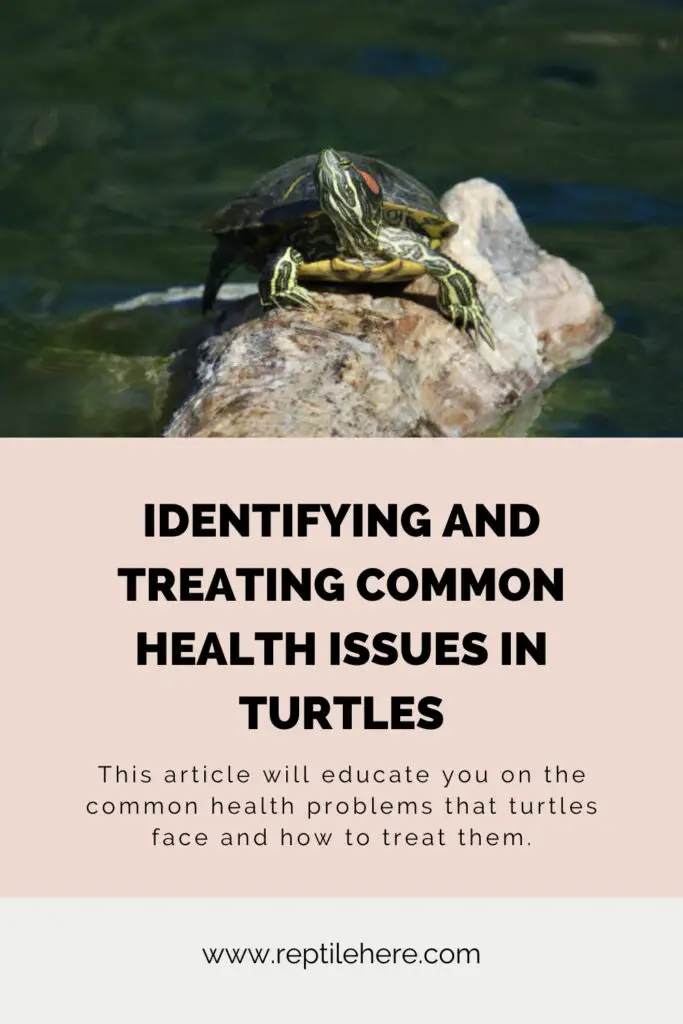Identifying and Treating Common Health Issues in Turtles
Your pet turtle isn’t immune to diseases and can get sick at any time. Mostly, your turn falls ill due to poor animal husbandry. Though sometimes it may still get sick even with proper care. As a turtle owner, you should be able to identify the most common heath issues in pet turtles and treat them to ensure your pet stays in good health at all times.
This article will educate you on the common health problems that turtles face and how to treat them. We’ll discuss the causes and symptoms of various health problems in turtles such as respiratory infections, shell infections, etc. We’ll offer tips on how you can prevent them from occurring by regular checkups of your pet.
Most common turtle health issues and how to treat them
Contents
Here are the most common health problems turtles face, their causes, key symptoms, and treatment options:

Respiratory infections
Respiratory infections are quite common among pet turtles and are caused by bacteria. They result from poor water conditions or poor housing conditions.
However, respiratory tract infections in turtles may also be a secondary infection caused by vitamin A deficiency (more details coming up).
A turtle that’s suffering from respiratory tract infection shows key symptoms such as wheezing, nasal discharge, excess mucus in its mouth and eyes, loss of appetite, lethargy, gasping or opening its mouth to breathe, and extending its next to breathe.

The treatment options for respiratory infection in turtles involve administering antibiotics orally or by injection. Nose drops may also be given.
You’ll also need to improve your turtle’s living conditions and give it good care such as warm water soaks to help it recover.
Vitamin A deficiency
Vitamin deficiency is also known as hypovitaminosis A and is caused by feeding your turtle an inappropriate diet. For instance, feeding your turtle low-quality commercial iceberg lettuce, pellets, or an all-meat diet puts your turtle at risk of this disease.
Lack of vitamin A in turtles is characterized by changes in the outer skin layer (epidermis) as well as in the mucus-producing membranes and glands that line up the eyes, mouth, kidneys, and even the upper respiratory tract.

Key symptoms include lethargy, lack of appetite, swelling of eyelids and the ear (due to ear abscess formation), and respiratory tract infections. (Source).
Treatment of this disease involves administering vitamin A orally or through injection. And it should be done under the supervision of a reptile vet. Otherwise, overdosing of the vitamin can lead to another condition known as hypervitaminosis A.
Shell rot
Shell rot is a shell infection that’s common among aquatic turtles and is caused by fungi, bacteria, or parasites or due to poor living conditions.
In some cases, the infections can be secondary to burns, trauma, or bites. Lack of a good basking spot where your turtle can dry off can also increase the risk of shell rot.
Some shell infections may even penetrate deep into the shell layers and cause pitting of the shell, ulcers, or even extend to bones lying underneath. Overall, the shell acts as a protective layer for the internal organs of the turtle.

Key symptoms of shell rot include shell softening, foul odor, discoloration, and discharge from some parts of the shell. The shell may also start pitting and parts start falling off as this condition progresses.
The best way to treat this disease is to clean the affected area and administer topical or oral antibiotics under the guidance of a vet. Improving the living conditions of your turtle will also help prevent shell infections in future.
Metabolic Bone Disease
The metabolic bone disease (MBD) is another common illness that affects pet turtles. It is usually caused by lack of vitamin D due to insufficient exposure to UV rays.
This vitamin deficiency then makes it hard to absorb calcium from the food you feed your turtle, and it ends up with MBD issue.
This disease causes shell deformities and weakening of bones in your turtle. Key symptoms include softening of the shell, lethargy, and difficulty moving.

When you notice your turtle exhibiting signs and symptoms of MBD, you should immediately take it to your vet for proper examination and the best treatment. Treatment options include administering vitamin D and calcium supplements.
Additionally, your vet may recommend providing supportive care to your turtle such as physical therapy to help with the recovery process.
Abscesses
Abscesses refer to swellings that occur anywhere on your turtle’s skin, including around the ears, eyes, side of the head, behind the eyes, etc.
They appear in the form of hard, tumor-like swellings and are usually pus-filled. The issue is related to vitamin A deficiency in pet turtles.
Treating an abscess in your turtle will require a surgical procedure. The abscess will be opened and then flushed using an antiseptic solution.
Your vet may also consider a culture of the abscess to help them determine what causes the abscess. They may also recommend injectable and topical antibiotics as additional treatment options.
Parasites
Gastrointestinal parasites such as roundworms are another common health issue faced by turtles in captivity.
In most cases, these parasitic infections usually cause no clinical signs in turtles and can only be detected during routine fecal examination by a vet.
However, when the infections become severe, they can result in weight loss, blood in feces, and diarrhea.

To treat parasitic infections, your vet will recommend deworming medication.
However, the vet will first need to examine the turtle’s fecal matter under a microscope to find out what kind of parasite has infected
This will enable them to recommend the most appropriate deworming medication.
IMPORTANT: Generally, a sick turtle will show symptoms such as lethargy, loss of appetite, nasal discharge, swelling of eyelids and ears, soft shell, shell discolorations changes in buoyancy, red skin, and poor muscling.
If you notice a combination of these symptoms in your turtle, then it’s a sign he’s sick and you should seek veterinary help as quick as possible.
Turtles may also contract some illnesses from humans, though they can also transmit diseases such as salmonella to their owners.
Preventive measures for various pet turtle diseases
Most of the common turtle health issues arise from poor animal husbandry and can be prevented by taking good care of your pet turtle.

Here are some helpful preventive measures you can take to keep your turtle healthy:
Offer suitable living conditions
Your turtle can get sick easily if you keep it in a dirty environment, so keeping its environment clean is crucial for its health. Besides, you should provide it with adequate heating and lighting and ensure the water temperature stays at the recommended range for your turtle species.
Feed it the proper diet
You should also ensure you feed your turtle a balanced diet that consists of both animal and plant materials. You can feed your turtles commercial pellets, but be sure to supplement them with vegetables, fruits, and live prey.
Take your turtle to the vet for regular check-ups
Regular vet visitations can also help prevent health problems from occurring in your pet turtle. Your vet will be able to catch any of the health issues above before they get severe. Also, your vet will offer professional advice regarding diet and living conditions to further help keep your turtle safe from various illnesses.

Final Verdict
The most common health problems pet turtles experience includes respiratory infections, shell rot, vitamin A deficiency, metabolic bone disease, parasitic infections, and abscesses. By knowing the symptoms of each illness, you’ll be able to easily identify what issue you’re dealing with immediately and treat take the right action to treat it.
Keep in mind that most pet turtle diseases arise from poor animal husbandry. Therefore, taking good care of your turtle can keep it healthy and safe from these diseases. Ensure you keep its environment clean, feed it a varied and balanced diet, and take it to the vet for regular checkups. Follow these tips religiously and your beloved pet turtle will stay healthy at all times!


